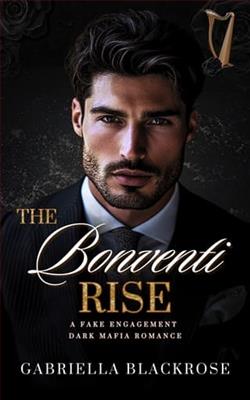Page 27 of Murder at the Seven Dials
“Forgive me,” Genie said after moment. “This must be torture for you.”
Audrey gathered herself, trying not to think of the things that had kept her awake last night. Like the fact that Philip could be stripped of his title, his fortune, his estates, and holdings…that he could be sent away by force the same way the first man he’d ever cared for had been.
Frederick Walker and Philip had been close at Cambridge, finding a common preference to books than to shooting, and conversation and music to billiards. In Freddie, Philip found a friend. Then, he’d become something more. Unfortunately, over a summer holiday from term, Freddie was discovered by his father in a tryst with another young man. Had it been a woman, a wedding would have ensued. Instead, Freddie’s father had sent him to the north, to a place much like the one Audrey had suffered for two wretched years when she’d been seventeen years of age. She had never known Freddie Walker, but she could sympathize with him.
Philip had learned of his circumstances through gossip at Cambridge when term resumed, and he had not seen him again. It was as if Freddie had been erased from existence. Ever since, the fear thathewould be erased had lived in the back of his mind.
“It is Philip going through the torture, not I,” Audrey now told Genie.
“Don’t discount your own adversity,” she replied, and while Audrey knew the advice was well-meant, she bristled. The only thing that hung in the balance for Audrey was her reputation and social standing. Philip stood to lose so much more…unless Audrey could find the one who had truly harmed Miss Lovejoy.
She cast her whole attention onto her sister-in-law. Genie was a kind soul, sweet and earnest. Sometimes, Audrey wondered if Genie didn’t feel gloriously lucky to have won the affection of a younger man from such solid circumstances. Though perhaps that wasn’t charitable. Audrey herself had felt lucky, too, when Philip had proposed a marriage of friendship. It had saved her, much as Genie had been saved from spinsterhood.
Audrey believed Genie sincerely cared for her and Philip. She was bargaining on it, in fact.
“I’ve been closed up at Violet House, afraid to so much as take a breath. I thought I might convince you to take a turn with me in the park?”
It was just past two; a fashionable time for ladies and gentlemen of good society to be parading through Hyde Park. A quiver of uncertainty, and a little bit of tension, coiled in her stomach at the thought of seeing her peers, but if she could lay eyes upon Lady Wimbly and find an excuse to speak to her…well, perhaps she could findsomethinguseful for her investigation.
She saw her misgivings reflected in Genie’s expression. “Oh. Well, of course fresh air would be good for your restless state,” she began, though clearly flummoxed on what more to say.
To be seen with the Duchess of Fournier in so visible a place would be a social gamble, and Audrey was almost certain Michael had advised his wife to do no such thing.
Genie continued to waver. Audrey made her next move by feigning a gasp and averting her eyes. “Of course, I understand. How thoughtless of me. You can’t possibly be seen with someone like me now. Please excuse me, Genie, I meant no harm.”
Audrey stood, surprised to feel the sting of real tears behind her lashes. Perhaps it wasn’t all an act, she considered as she started toward the sitting room door. It took only a few more moments before her sister-in-law crumbled.
“Oh no, please, don’t leave!” She rushed in front of Audrey to block her retreat. “You are family, and I shan’t give a whit what anyone says. It’s absurd for you to hide away as though you’ve done something wrong. Now, put it out of your mind, and let’s take our stroll.” She gave a tight nod as if making a firm decision and left the sitting room to call for her butler.
Within minutes they were seated within Lady Herrick’s town coach and moving toward the expanse of green park a few blocks away. Audrey felt a modicum of guilt at tricking Genie into taking the stroll, but once they had been let out and were walking along the gravel path toward the Serpentine, she chose to commend herself instead.
Scores of ladies were taking their strolls, with many more men and women riding past slowly in curricles or on horseback. A fair amount of sun seekers lounged at picnics, enjoying the warm, early spring afternoon. Ladies had set up their easels and watercolors here and there, attracting lookers on and, most importantly, men.
“You see, all is well,” Genie said in a sprightly voice as they walked, perhaps just a little too swiftly. Audrey had caught a few curious glances but from no acquaintances just yet.
She kept her eyes sharp for Lady Wimbly’s shapely figure. The viscountess was in her mid-forties and had a penchant for hats with so much plumage one might suspect a whole pheasant roosted upon her head. She also favored the colors of autumn—shocking orange and yellow, and all too often, bronze and gold. If she were here, there would be no missing her.
“It’s kind of you to walk with me,” Audrey said, feeling as though she ought to acknowledge it.
She and Genie had little in common. In truth, she had little in common with most women she met. As much as she despised admitting it, her conversation generally leaned toward the realm of dull. She couldn’t count the number of times she’d either been taking tea at a lady’s home, or moving through the Pump Room at Almack’s, or standing in a circle of peers at a soiree and found that her tongue felt like it weighed ten stone. She’d question what difference it would make if she spoke at all. Listening in to the conversation around her, it seemed to always be as substantial as morning mist. Expected and easily forgotten.
Philip often accused her of being melancholy. Perhaps she was. Or perhaps it was just the circles she moved in that made her feel dull and heavy…and extraordinarily different.
“Another creature resides within you, my dear. I can see it whenever you blink.”Lady Beatrice Gladdington had startled Audrey with this observation. They were the first words the older lady had spoken to Audrey during her stay at Shadewell Sanatorium in Northumberland. All up and down the long table inside the dining room at Shadewell, eyes had lifted, and spoons had lowered—the patients were never given forks. Prongs were a possible hazard to self and others.
“My lady?”Audrey had asked.
“It sees what others cannot,”the woman went on in her sing-song voice.“It is extraordinary, wouldn’t you agree?”
The attendant had approached then, settling a hand onto Lady Gladdington’s shoulder and asking if all was well. The older woman had growled, nipping at the attendant’s fingers. Then, she’d laughed uproariously at the attendant’s shocked expression.
It sees what others cannot. It is extraordinary, wouldn’t you agree?
Yes. Audrey would agree that her sight fell into the appropriate definition of extraordinary. While Lady Gladdington had said the word with marked awe and admiration, Audrey felt only contempt for the ‘creature’ living inside her.
She often wished the doctors and nurses at Shadewell had been able to do as they claimed they would—to eradicate it from her mind. To make her well and normal. Unfortunately, two years inside the spartan and austere walls of Northumberland’s convalescent hospital had only taught Audrey the incalculable value of pretending. Of saying as little as possible.
Looking back, it was no wonder that once she’d returned from Shadewell, she’d been afraid to speak. The anger she harbored toward her mother and uncle, the two people who had committed her to the sanatorium and then failed to visit or write for the next two interminable years, had lived on the very tip of her tongue. Whenever she parted her lips, she feared vitriol would spew out in place of tolerable words. She could hear them in her mind—unintelligible phrases and maniacal screeches that reminded her of the other patients at Shadewell. The ones that would scream out their lungs and drag their fingernails along the walls until they tore and bled.















